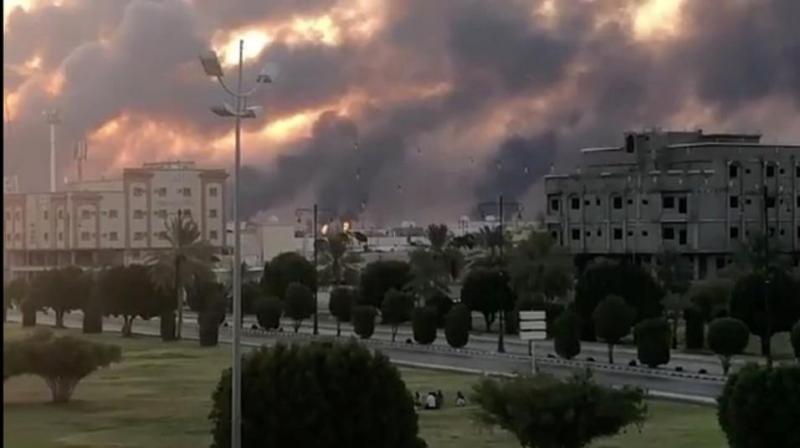Yemeni rebels claim drone attacks on Saudi Arabia\'s Aramco oil plants
The attacks come as Saudi Arabia, accelerates preparations for a much-anticipated initial public offering of Aramco.

Saudi Arabia: Yemen's Iran-aligned Huthi rebels on Saturday claimed drone attacks on two Saudi oil facilities, according to the group's Al-Masirah television.
The rebels launched "a large-scale operation involving 10 drones that targeted refineries in Abqaiq and Khurais in eastern Saudi Arabia", Al-Masirah said.
Fires at the two oil sites are now under control.
Drone attacks sparked fires at two Saudi Aramco oil facilities, the interior ministry said, the latest such assault claimed by Yemeni rebels as the energy giant prepares for a much-anticipated stock listing.
Huge palls of smoke rose into the sky after the pre-dawn attacks on Abqaiq and Khurais, two major Aramco facilities in eastern Saudi Arabia, which follow a spike in regional tensions with Iran.
The attacks highlight how the increasingly advanced weaponry of the Iran-linked Huthi rebels -- from ballistic missiles to unmanned drones -- poses a serious threat to oil installations in Saudi Arabia, the world's top crude exporter.
"At 4:00 am (0100 GMT) the industrial security teams of Aramco started dealing with fires at two of its facilities in Abqaiq and Khurais as a result of... drones," the interior ministry said in a statement carried by the official Saudi Press Agency.
"The two fires have been controlled."
The statement added that an investigation had been launched after the attack in the kingdom's Eastern Province, but did not specify the source of the drones.
It also did not say if there were any casualties or whether operations at the two facilities had been affected.
The full extent of the damage was not immediately clear as reporters were not allowed near the plants where Saudi authorities appeared to have beefed up security.
In recent months, the Huthi rebels have carried out a spate of cross-border missile and drone attacks targeting Saudi air bases and other facilities in what they say is retaliation for a long-running Saudi-led bombing campaign on rebel-held areas in Yemen.
Last month, an attack claimed by Yemen's Huthi rebels sparked a fire at Aramco's Shaybah natural gas liquefaction facility -- close to the Emirati border -- but no casualties were reported by the company.
Rebel drones also targeted two oil pumping stations on Saudi Arabia's key east-west pipeline in May, shutting it down for several days.
The growing attacks underscore how Saudi infrastructure, including oil installations, are increasingly vulnerable to rebel attacks four years after a Saudi-led coalition launched a military intervention in Yemen.
The Abqaiq facility, 60 kilometres (37 miles) southwest of Aramco's Dhahran headquarters, is home to the company's largest oil processing plant. It has been targeted by militants in the past.
In an attack claimed by Al-Qaeda in February 2006, suicide bombers with explosive-laden vehicles attempted to penetrate the processing plant, killing two security guards.
The two bombers also died in the attack, which failed to breach the compound, authorities reported at the time.
In 2014, a Saudi court sentenced a man to death for links to the 2006 attack. Two other Saudis were jailed for 33 and 27 years respectively, state media reported.
Khurais, 250 kilometres from Dhahran, hosts a major Aramco oil field.
Tensions in the Gulf have soared since May, with US President Donald Trump calling off air strikes against Iran at the last minute in June after it downed a US drone.
The United States and Saudi Arabia have also blamed Iran for multiple attacks on tankers in the Gulf.
The latest attacks come as Saudi Arabia, the world's top crude exporter, accelerates preparations for a much-anticipated initial public offering of Aramco.
The mammoth IPO forms the cornerstone of a reform programme envisaged by the kingdom's de facto ruler Crown Prince Mohammed bin Salman, a son of King Salman, to wean the Saudi economy off its reliance on oil.
Aramco is ready for a two-stage stock market debut including an international listing "very soon", its CEO Amin Nasser told reporters on Tuesday.

